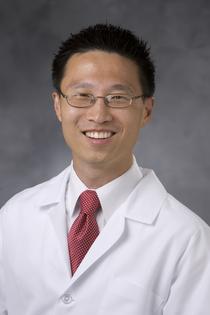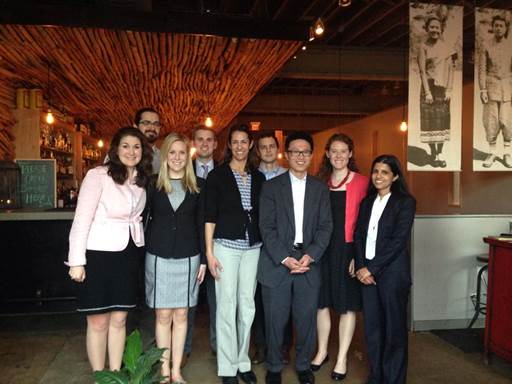
Alex Cho, MD, MBA, is the subject of our next faculty spotlight. Before delivering the next Department of Medicine Grand Rounds presentation on March 20, he took some time to talk with us about a multi-year effort to redesign the care delivery model at the Duke Outpatient Clinic, Duke’s Ambulatory Care Leadership Track program, and simultaneously earning his GIM fellowship and his MBA, while raising two children.
How long have you been at Duke? How long have you been at the division?
I came to Duke and the division for my GIM fellowship in 2004 and I’ve been lucky enough to be here since. Prompted by my residency program director, I was interested in pursuing fellowship training as well as an MBA at the same time, and Duke was the only place where I had the capacity and the permission to pursue both.
What was that experience like?
It was very exciting, but also a very busy time for me. To make matters even more hectic, our two children (Noah, almost 9) and Abby (7) were born during this period; and my father experienced a disabling stroke. Luckily I had a lot of support from the division and some great role models and mentors to help me.
What are your research interests?
My prior research had been on patient self-management and health behavior, including their intersection with technology (e.g., internet, genomic risk testing). I am also intensely interested in innovation in primary care and population health-oriented models of care, such as the one that has been established at the Duke Outpatient Clinic. Currently, George Jackson and I are assisting with a Duke Medicine-wide primary care collaborative, which itself represents a real-time study of organizational and care delivery change.
What does a typical day for you look like? What are your responsibilities within the division?
I spend about half my time in Network Services, in the Duke University Health System, where I’m helping lead the development of an institutional telemedicine program. The other half of my time is currently split between working with the Duke Internal Medicine Residency Program, where I am for now the associate program director for Ambulatory Care; and attending at the Duke Outpatient Clinic, where I have been involved in an ongoing Redesign, and occasionally at Duke Regional Hospital as well. Finally, I’m also involved in the Duke Medicine Transforming Primary Care Collaborative, and connected to that an effort to create a supported “space” for innovation within primary care at Duke generally.
What is the ACLT program? What has been your involvement in the program?
The Ambulatory Care Leadership Track (ACLT), conceived by Larry Greenblatt and as of this year now led by Dani Zipkin, is a two-year track within the categorical program for second- and third-year residents with a particular interest in primary care and ambulatory subspecialty careers. Now in its third year, it has been a wonderful vehicle for creating a community of residents with these interests; and strives to provide them with experiences that help them prepare to become academics, clinicians, leaders, and teachers in the outpatient arena.
One of my main contributions has been to help create an advocacy experience for the residents, at both the state and national level, working with the Duke University Health System Office of Government Relations. At the beginning of March of this year (odd-numbered years being when the long session occurs), the ACLT residents traveled to Raleigh to meet with legislators and advocate for an issue of their choosing, in this case provider-led Medicaid reform. Last year, the ACLT residents traveled to Washington, DC, to speak with representatives from Congress from their home districts; and will do so again next year.
You’ll be delivering the Department of Medicine Grand Rounds on March 20. What will you be speaking about?
Well, the first thing I’ll say is that there will be six of us presenting, and that only begins to scratch the surface of the dozens of individuals – whom we attempt to acknowledge on a very long “Thank You!” slide – who were key to making what we’ll be presenting possible, i.e., a multi-year effort to redesign the care delivery model at the Duke Outpatient Clinic.
Briefly, we’ll be walking through the buildup to, planning effort behind, and implementation and outcomes of the redesign to date. The DOC faces many of the same issues a lot of other safety-net clinics face – an underserved, disadvantaged population, complicated by the fact that the vast majority of care is provided by residents. This is great in terms of the ownership the residents can have but presents its own challenges as well.
But like I said, the efforts of more than 30 people – frontline staff, nursing, pharmacy, social work, residents, community health, hospital administrators, and GIM faculty and other clinic providers – laid the groundwork, facilitated a thoughtful planning process, and made the changes that we’ll be talking about stick, which have yielded some significantly positive results. And the drive to innovate continues, to make improvements that are sustainable and realistic, but that also make a difference in the lives of the clinic’s patients.
Have you read any interesting books, websites, articles, or other material that could be of interest to the division?
Right now, I am reading a great book called The Power of Habit: Why We Do What We Do in Life and Business, by New York Times reporter Charles Duhigg. Full of insights relevant to health and healthcare, and examples ranging from former Alcoa CEO Paul O’Neill’s use of keystone habits around safety to transform that organization, to stories of individual change made possible by the creation of new habit loops – both consciously as well as accidentally.
What passions or hobbies do you have outside of the division?
Politics, reading, listening to electronic music, indoor climbing, road trips, March Madness brackets.

